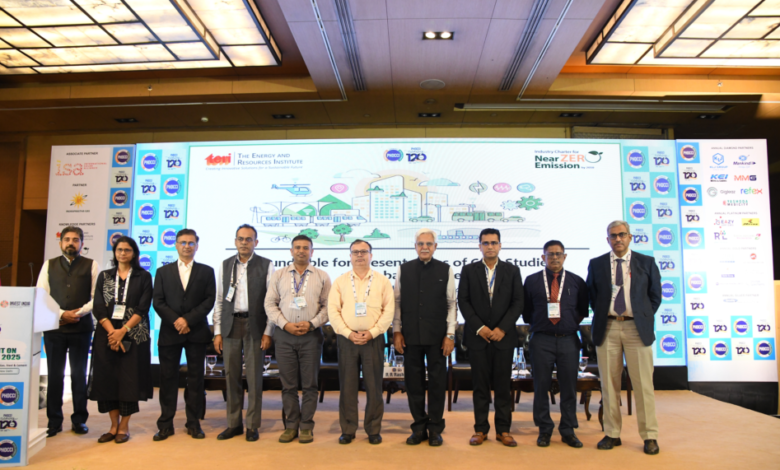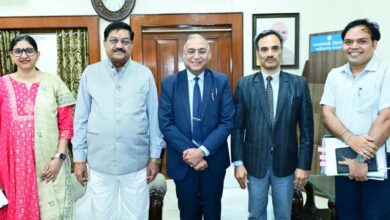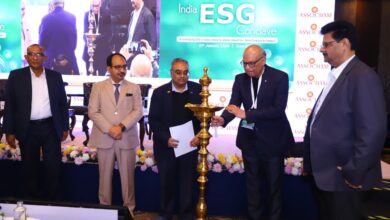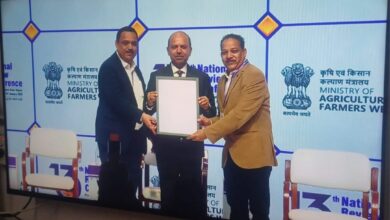Global Sustainability Summit 2025: TERI Showcases Industry Solutions for a Low-Carbon Future

New Delhi : Decarbonizing India’s most carbon-emitting sectors—steel, cement, and oil and gas—took centre stage at the PHD Chamber of Commerce and Industry (PHDCCI) Global Summit on Sustainability 2025, where The Energy and Resources Institute (TERI), as Knowledge Partner, co-hosted a Technical Session titled: ‘Hard-to-Abate Sectors: Decarbonization in Action.’
The session convened policymakers, industry leaders, technocrats, green technology innovators, academicians, think tanks, investors, and solution providers to deliberate on practical strategies for accelerating low-carbon pathways across India’s most emission-intensive sectors. Curated under the aegis of TERI’s Industry Charter for Near Zero Emission Ambition by 2050, the roundtable showcased a selection of industry case studies and innovative solutions, underscoring the importance of collaborative action and knowledge-sharing in enabling climate-resilient growth.
Opening the session, Mr Arupendra Nath Mullick, Associate Director, TERI-Council for Business Sustainability, highlighted, “The heavy industries shall be providing the materials to support a modern economy. Together with champions of the Indian industry, we acknowledge that businesses play a vital role by understanding the opportunities of low-carbon economy and challenges on one hand, and by mobilizing resources and offering know-how and solutions, on the other.”
The discussion was moderated by Mr RR Rashmi, Distinguished Fellow, TERI, who emphasized a phased yet ambitious approach to transition. “India is responding to both global impulses and its domestic commitments under the NDC. While immediate actions are important, achieving net zero will require a comprehensive sectoral framework. Both supply- and demand-side measures, across energy efficiency, industrial transitions, technology and finance, and demand management, will be central to this journey. While India has already released its Long-Term Low Emission Development Strategy (LT-LEDS) covering key sectors, the detailed sectoral roadmaps are still under preparation. These will be vital in guiding how we achieve our long-term climate objectives,” Mr Rashmi averred.
The panel featured perspectives from industry implementers and solution innovators, sharing on-the-ground experiences and breakthrough practices.
Mr Sanjay Kumar Singh, Director- Strategy & External Relations, Jindal Steel Ltd., reflected on the complexities of greening India’s steel sector, particularly given the mix of large integrated producers and medium-sized secondary steel producers. Mr Singh stated, “Most major steel producers have set decarbonization targets between 2047 and 2050. But greening the sector does not automatically mean zero emissions. For instance, blast furnaces will continue to rely on coke, which emits carbon dioxide. The real challenge lies in how much of these emissions can be captured. Moreover, nearly 40% of India’s steel is produced by small and medium enterprises, who face greater hurdles in adopting new technologies. Transition costs, technology access, and skill development remain pressing issues. While large players are beginning to adopt new processes, the broader question is: how do we ensure the entire steel sector becomes truly green, and who bears the responsibility for that transition?”
Mr Sangeet Jain, Board member and VP ESG strategy & Alliances, LanzaTech Pvt Ltd., highlighted the circular solutions for hard-to-abate sectors through carbon recycling technologies. “With the power of biology, we are now able to recycle carbon in new and impactful ways. Our technology converts waste gases from industries like steel and ferroalloys into ethanol and other chemicals and has already been deployed at multiple commercial scales worldwide. In India, projects such as our collaboration in Panipat demonstrate the potential of these solutions, including pathways to produce sustainable aviation fuel. These ‘carbon-smart’ chemicals are already being used in products like polyester, showing how recycled carbon can create tangible consumer goods. The challenge before us is to scale and deploy more such units, enabling low-carbon fuels and chemicals to become mainstream in India’s industrial ecosystem,” added Mr Jain.
Mr Yogesh Patgunan, Circular Economy Strategist, Sperry Green Technology Pvt Ltd noted, “Hard-to-abate plastics like PP, ABS, and HIPS are critical to industries but pose serious sustainability challenges. Through our Circular Production Program, we are demonstrating how waste audits, reverse logistics, advanced recycling, and digital traceability can turn these complex waste streams into high-quality, traceable, and profitable circular solutions for businesses.”
The session reaffirmed that decarbonizing hard-to-abate sectors is not merely a technological challenge but a collective endeavour–requiring policy vision, financial innovation, and strong industry commitment. As Knowledge Partner, TERI reiterated that platforms such as the Industry Charter for Near Zero Emission Ambition by 2050 will continue to act as catalysts for collaboration–bringing together stakeholders to pilot solutions, share knowledge, and scale transformative action. By fostering partnerships across sectors and borders, TERI remains committed to advancing India’s climate and development goals while contributing to the global net-zero transition.







